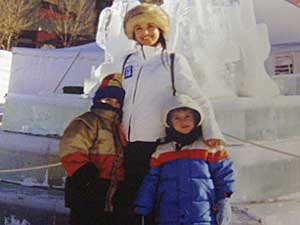|
Audio
Photos
More from MPR
Your Voice
|
Bulgarian couple fight deportation
February 17, 2004
A Bulgarian couple living in Plymouth face deportation after they sought asylum in the U.S. They are the most recent example of how the U.S. Justice Department has changed its enforcement and appeals process since Sept. 11, 2001. Critics are concerned that the changes will cost asylum seekers a fair hearing of their cases.
St. Paul, Minn. — Last September, Attorney General John Ashcroft ordered the Board of Immigration Appeals to clear its backlog of more than 50,000 cases within six months. To speed up the process, Ashcroft cut the number of judges who review cases from a panel of three to one. And the new rules allowed judges to make their rulings without offering an opinion -- a reason for why they made their decision.
That is what happened to Ionko Ionkov and his wife, Petia Lazarova.
They have been in the U.S. for nine years and have two boys, ages 5 and 7. The family lives in Plymouth, a quiet, sprawling suburb northwest of Minneapolis. Ionko owns a trucking business and his wife worked as an office assistant until last Thursday, when she was arrested by immigration officials.
He fears he's next, so he and his sons moved out.
 | |||
"I don't stay in my house. I'm with friends. With the two kids it's very difficult because they have their needs -- they want to go and play outside," says Ionkov. "Even right now my oldest son, the first grader, says, 'Daddy, when can I go back to school to pick up my Valentine's bag?'"
Ionkov and Lazarova came to the U.S. as students, and their student visas expired in the mid-1990s. Ionkov says they applied for extensions but heard nothing from the INS. He says their attorney told them that if they hadn't heard anything from the government, things were probably OK.
But in 2001, the INS contacted the couple and told them they were in violation of federal law, and eligible for deportation. That's when Ionkov applied for political asylum. He says Bulgaria is not a safe place to live or raise a family.
"Even right now it's a very dangerous place. It's like, there's no order, basically. It's run by the mafia. A lot of corruption going on. It's terrible place. People living very poorly," says Ionkov.
|
The perception is -- if you're here for a long time you build a life, you have some kids, you marry a U.S. citizen, then it's kind of like, 'Olly, olly oxen-free, everything's OK.' Under the law, that's not the case.
- Tim Counts, immigration official |
Last year, a judge at the Board of Immigration Appeals in Chicago decided that Bulgaria was not so terrible that Ionkov and Lazarova would be in danger if they returned. The judge denied the couple's request for asylum.
Ionkov's lawyer, David Butbul, says 10 years ago, Ionkov and his wife would not have been as closely pursued by immigration officials. Butbul says the change is the result of reforms that started in the mid-'90s, but were accelerated by the Bush Administration after Sept. 11, 2001.
"We know that the immigration judges at the Board of Immigration Appeals are under a lot of pressure from the Justice Department, from Mr. Ashcroft, to make a decision in a very, very quick manner," says Butbul.
In fact, some experts claim judges have only 15 minutes on average to hear a case. As in the case with Ionkov and Lazarova, the judge often doesn't write an explanation of why the appeal was denied.
Butbul says the couple can appeal to a higher court. However, he says it's hard to appeal a decision without knowing why the judge ruled against you.
"When you are filing a notice of appeal, you provide a very large brief as to why you believe the immigration judge made a mistake for not granting asylum, for example," says Butbul.
Tim Counts is with the Immigration and Customs Enforcement bureau, formerly known as the Immigration and Naturalization Service or INS.
"There's often the perception out there that we can deport someone or not deport someone, depending upon our mood that day. But that isn't the case," says Counts.
Counts says the Bulgarians broke the law, and overstaying on a visa is a serious offense.
"The perception is -- if you're here for a long time you build a life, you have some kids, you marry a U.S. citizen, then it's kind of like, 'well, olly, olly oxen-free, everything's OK.' Under the law, that's not the case," says Counts.
Counts says his department cannot deport Ionkov's young children, because they are American citizens. The children can either stay in the U.S. or they can go with their parents. Ionkov says if he is deported he won't leave the kids behind.
Critics have argued that immigration judges are failing to give asylum seekers a meaningful review of their cases. However, last December a federal appeals court had the chance to overturn Ashcroft's controversial policies, but chose to uphold them.
|
News Headlines
|
Related Subjects
|

